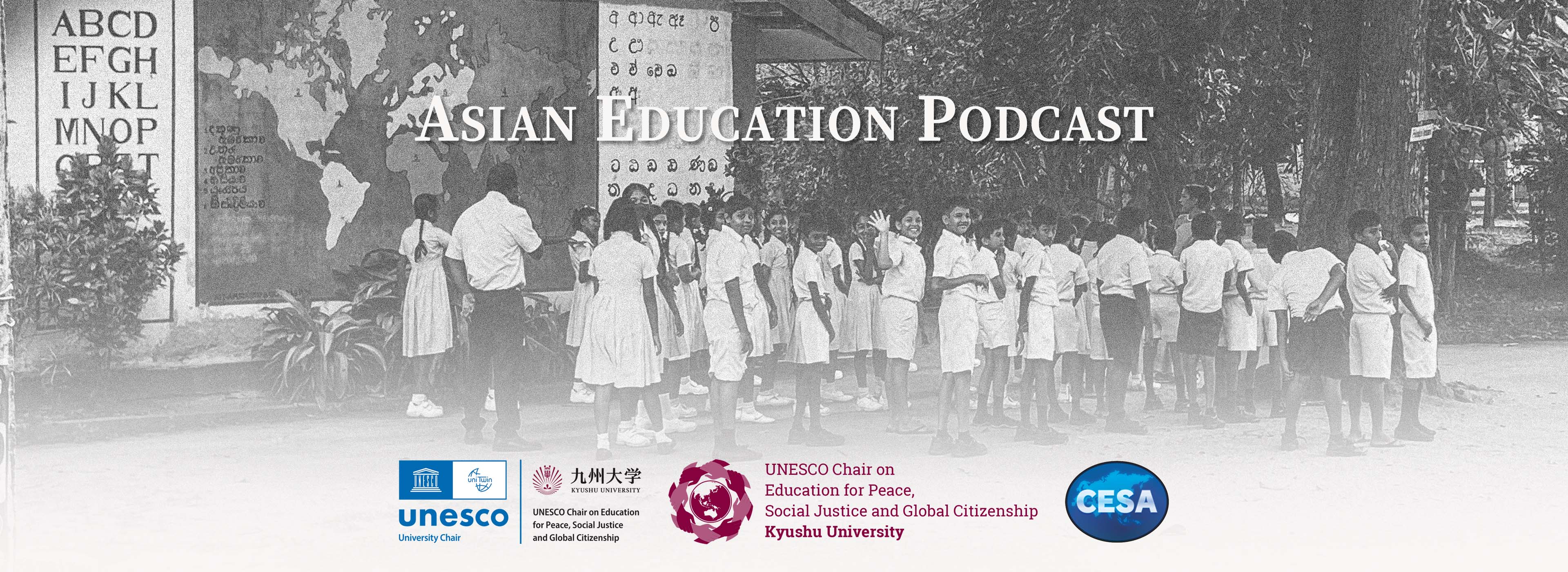 In this initial episode of the Asian Education Podcast recorded on 11 February 2023, the three co-hosts discuss the rationale and focus of the podcast as well as their backgrounds and experiences related to education policy and practice in Asia and beyond.
In this initial episode of the Asian Education Podcast recorded on 11 February 2023, the three co-hosts discuss the rationale and focus of the podcast as well as their backgrounds and experiences related to education policy and practice in Asia and beyond.
0. Introduction (00:00-03:05)
1. Why the Asian Education Podcast? (03:06 – 06:32)
What is the rationale for having a podcast that discusses education from a primarily Asian perspective? It is not necessarily that we are keen on setting up ‘Asian’ standards to challenge or counter the hegemony of Western-centric perspectives. The idea of ‘Asia’ itself, like any other category, is arbitrary and yet has been institutionalized and carries both symbolic and political weight. The thread that ties the three of us is the Mahatma Gandhi Institute of Education for Peace and Sustainable Development (MGIEP), which is an integral part of UNESCO’s Education Sector and its only ‘Category 1’ research institute in Asia. MGIEP produced a report titled Rethinking schooling for the 21st century: the state of education for peace, sustainable development and global citizenship in Asia in 2017, for which Yoko and Ed, along with Krishna Kumar, served as coordinating lead authors. However we define ‘Asia’, whether in terms of economic clout or population, it accounts for about half the world population. So, we are dealing with a ‘region’ which should be central to global debates about the future of humanity and the planet. Here we agree with the ‘decolonialists’ that Asian perspectives on education generally do not get the airing they deserve in global debates, which still tend to be largely shaped by scholars, actors and institutions that are based in ‘the West’. It is important to have an Asian platform for discussing education issues to provide a corrective to the Anglophone or West-centric bias in academic debate – both in 'the West' and, often, in ‘Asia’, too.
2. Who are we to speak for or about Asian education? (06:33 – 19:24)
Why, or to what extent, are the three of us qualified to speak for or about 'Asian education', or from Asian perspectives on education? Ed is currently based in Fukuoka, Japan, and has spent most of his adult life living and working in Asia; while Yoko, who is originally from Yokohama, Japan, worked in Delhi, India for seven years and now lives in Paris. Gairan from Manipur, India, is pursuing a PhD in Hong Kong. We critically reflect on our academic and professional experiences, our identities, our privileges as English speakers in Asia, and our ‘positionalities’: as ‘Viceroy Vickers’, as an East Asian woman who is stereotyped in a certain way within Asia as well as in ‘the West’, and as a junior scholar in Hong Kong from the ‘Mongolian fringe’ of what is today India.
3. What are the difficulties in having a critical debate on education in Asia? (19:25 – 33:25)
What are some of the difficulties or tensions involved in promoting critical debate over education, especially the politics of education, in the Asian context? How do we anticipate these difficulties impacting our work on this podcast? We lament the reduction of education debates in many Asian societies to a technocratic discourse of ‘what works’. This tendency has complicated historical roots that we’ll certainly discuss in future episodes, but it has been exacerbated in recent years by various policy trends. Examples include the influence in educational debate of quantitatively-trained economists, a related fondness for Randomized Controlled Trials (RCTs), and the shift of focus in Education for Sustainable Development (ESD) from a broad discussion of education’s purposes to a technical discussion of metrics for monitoring SDG 4.7. The emphasis on ‘what works’ diverts our attention away from the complex contexts, politics and ethics of education, hindering meaningful debate. In addition to the ‘tyranny of metrics’ and consequent narrowing of the education policy agenda, threats to academic freedom in Asia, as elsewhere, pose challenges to critical debate. This adds to the reasons for doing this podcast, and at the same time, presents difficulties in conducting a critical discussion on education with colleagues around Asia.
4. What are some of the topics we anticipate discussing? (33:26 – 45:04)
One topic is Social-Emotional Learning or SEL, which is becoming a global trend partly because of a recent attempt by the OECD to ‘measure’ social and emotional skills. We see SEL as reflective of wider efforts to ‘psychologise’ and depolitice education in general. This is particularly evident in areas such as ‘civics’, which used to be a carrier of a critical approach to citizenship and political issues in some Asian countries. Another, related topic is the fascination with quantitative metrics in the form of rankings and impact factors. Where does this fascination come from, and what do these metrics do to educational debates and academic research, particularly in Asian contexts? It is also intriguing to discuss meritocracy, which is today at the forefront of educational debates in the Anglophone scholarly community. Very little reference is generally made to Asia when meritocracy is discussed in ‘the West’, and Asian perspectives can shed new light on this debate. Last but not least, we will discuss patriotic education which is a prominent feature of the educational landscape across Asia, critically examining the relationship between nationalism and education’s role in political socialisation.
5. Conclusion (45:05 – 48:42)
Recommended readings:
Dimitar Gueorguiev (ed.) New Threats to Academic Freedom in Asia (Association of Asian Studies)

